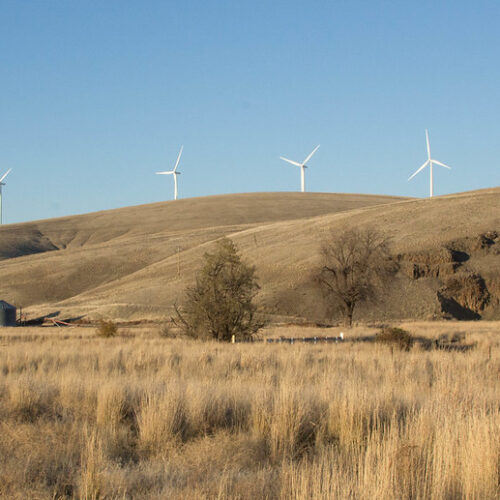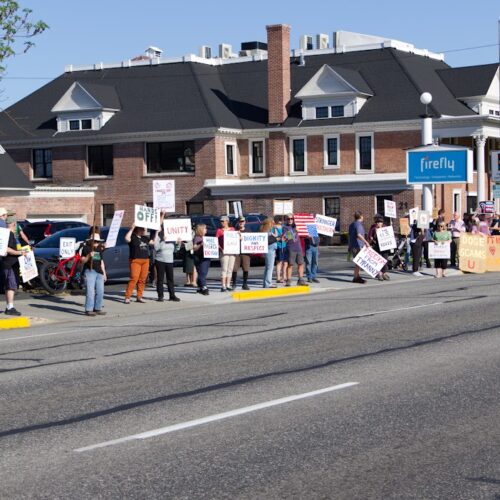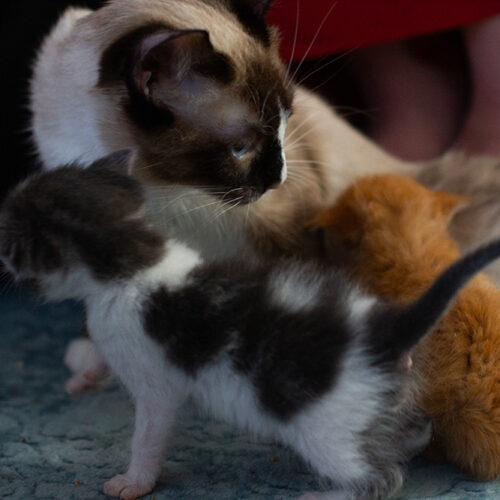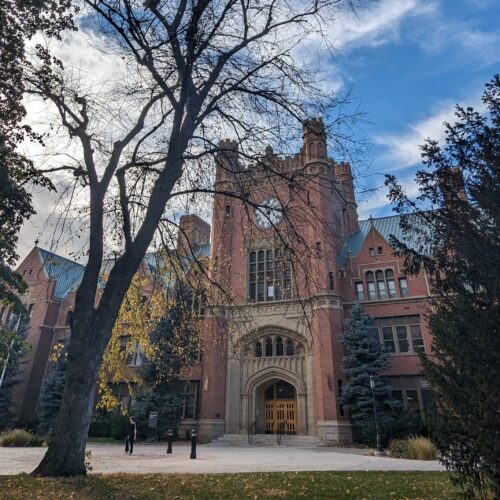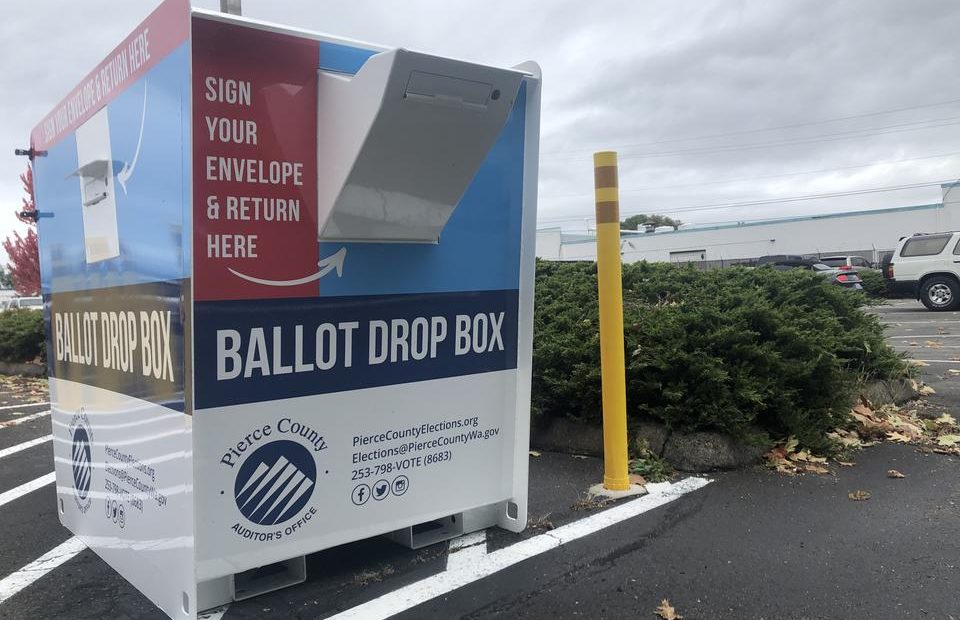
Washington’s 10th Congressional District Race Features Two Democrats. What Separates Them?
BY MELISSA SANTOS / CROSSCUT
One of the most competitive congressional races in Washington state this year is between two Democrats, each vying to represent the district that surrounds Olympia and Joint Base Lewis-McChord.
Marilyn Strickland, the former mayor of Tacoma, and Beth Doglio, a state representative from Olympia, are competing to represent the 10th Congressional District, which includes nearly all of Thurston County, most of Pierce County and part of Mason County.
The candidates have things in common, including plans to tackle climate change, boost police accountability and improve the federal government’s response to the COVID-19 crisis. But they differ in other areas, including how closely they have worked with business leaders throughout their careers.
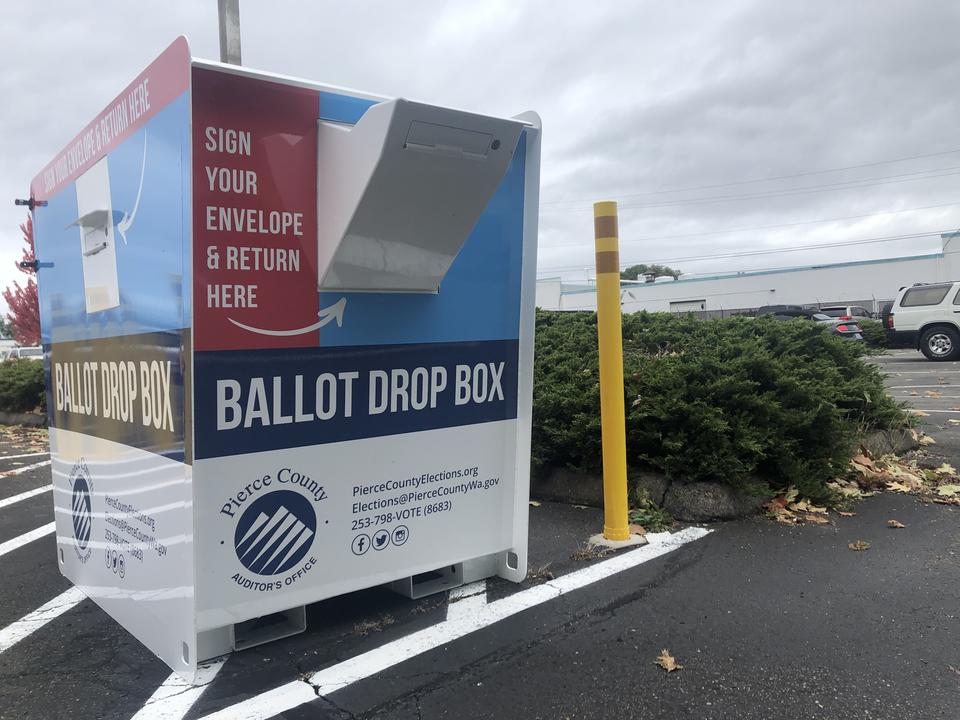
This ballot drop box in Pierce County is an example of one of the quarter-inch thick steel ballot drop boxes that local elections officials commissioned and designed with security in mind. CREDIT: Melissa Santos/Crosscut
As the top-two finishers in the Aug. 4 primary election, both candidates will appear on the November ballot.
While Strickland and Doglio each have experience in public office, their resumes diverge elsewhere.
After serving eight years as Tacoma’s mayor, Strickland spent two years as president and CEO of the Seattle Metropolitan Chamber of Commerce, where in 2018 she led the organization’s opposition to a per-employee “head tax” on Seattle businesses.
Doglio, meanwhile, is a longtime climate activist who was elected to the state Legislature in 2016. She has won the support of the more progressive wing of the Democratic Party, including U.S. Rep. Pramila Jayapal, D-Seattle.
If Strickland is elected, she would be the first Black person elected to represent Washington state in Congress. She also would be the first Korean American woman elected to Congress from any state.
If Doglio wins, she would be the first openly LGTBQ person to represent Washington in Congress.
Either candidate would be a change for the 10th District, which to date has been represented by only one person: U.S. Rep. Denny Heck, D-Olympia. Heck was the first person elected to represent the district after it was formed during the redistricting that followed the 2010 census.
Heck’s announcement last year that he was retiring from Congress prompted 19 candidates to run for his seat. Out of that crowded field, Strickland and Doglio came out on top.
Doglio, who was the founding executive director of Washington Conservation Voters, points to environmental victories as some of her biggest policy wins. As the regional co-director of the Power Past Coal coalition, Doglio fought against coal export terminals in Washington, working with Native tribes to block several of those projects. In that role, she was a leader in “stopping seven coal export facilities dead in the tracks,” she said.
In the Legislature, Doglio was also the prime sponsor of a measure to increase the energy efficiency of buildings, a key part of a climate package Gov. Jay Inslee sought last year.
For her part, Strickland is proudest of the work she did to lead Tacoma out of an economic recession when she was mayor from 2010 through 2017, she said.
That meant not only helping attract new private investment to Tacoma, but also achieving another “not so sexy” milestone: getting Tacoma voters to pass a street repair measure for the first time in decades.
Strickland said she also worked to strengthen partnerships between the city, businesses, community groups and Tacoma Public Schools to provide more wraparound services for students. She said that collaboration is part of what helped boost Tacoma Public Schools’ graduation rates from 55% in 2010 to nearly 90% by 2017.
Here’s how two finalists in the race compare on key policy issues.
Environment and climate change
Both candidates say there’s an urgent need to confront climate change, and each has specific ideas for reducing greenhouse gas emissions. Each supports enacting a nationwide low-carbon fuel standard that requires cleaner gas for cars and trucks, for instance.
Their plans differ in other ways, however.
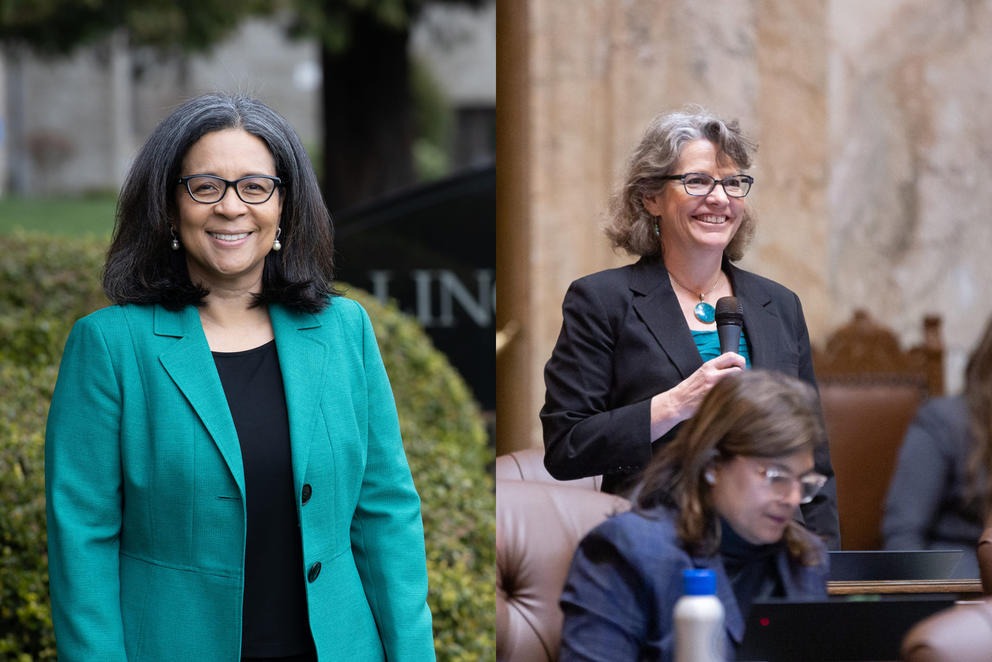
Marilyn Strickland, left, and Beth Doglio are the final two candidates competing to succeed U.S. Rep. Denny Heck in Washington’s 10th Congressional District. CREDIT: Strickland campaign; Doglio campaign
Strickland said she supports House Democrats’ Congressional Action Plan for a Green Energy Economy, which calls for making the U.S. economy carbon neutral by 2050. The plan calls for achieving net-zero emissions in the electricity sector by 2040.
Doglio’s plan sets a more aggressive goal for decarbonizing energy production, requiring net-zero emissions in the electricity sector by 2030.
Doglio’s proposal also goes a step further by requiring completely carbon-free energy production by 2035. Her plan hopes to achieve that milestone even earlier, by 2030, the same timeline set by the Green New Deal.
Asked if she supports the Green New Deal, Strickland said she was more focused on passing policies that take tangible steps to reduce carbon emissions, noting that the Green New Deal is a nonbinding resolution.
Another area of contrast is the candidates’ past stances on fossil fuel projects.
While Doglio was opposing new coal export terminals, Strickland was clashing with local activists over two projects at the Port Tacoma that would rely on natural gas. One was a plant that would turn natural gas into methanol to be sent to China for use in manufacturing. Another was a liquefied natural gas (LNG) plant proposed by Puget Sound Energy.
Early on, Strickland expressed support for both projects. She later remained neutral in her public statements about the methanol plant and at times voiced concerns about transparency issues surrounding the LNG plant.
Strickland said both projects were initially billed as clean energy projects, which is why she had supported them. The LNG plant was to help tankers replace dirty marine bunker fuel with cleaner-burning natural gas, while the natural-gas-to methanol plant was promoted early on as a way to cut down on the burning of coal to make methanol in China.
Doglio said the methanol project was one example of where Tacoma citizens spoke loud and clear about not wanting it in their community, but Strickland wasn’t listening. The project ultimately was scrapped.
Inslee, known for his proposals to fight climate change, also supported both Tacoma projects in the beginning. He has since withdrawn his support for the Tacoma LNG plant, as well as a similar methanol plant proposed in Kalama. Strickland declined to say whether she thought the governor made the right move in withdrawing his support for those projects.
Gun control, immigration, policing reforms
Both Doglio and Strickland support reinstating national bans on assault-style weapons and high-capacity gun magazines.
Similarly, each candidate says they support immigration reform that would put an end to family separations and create a path to citizenship for immigrants already living in the U.S. without legal permission.
On criminal justice reform, the two candidates agree that a measure recently passed by the Democrat-controlled U.S. House, the George Floyd Justice in Policing Act, would institute important changes. Those include banning no-knock warrants, cutting funding to police agencies that allow the use of chokeholds, and requiring training to combat implicit bias and racial profiling. The legislation would also limit the qualified immunity that makes it difficult to hold individual police officers civilly liable for abuses of deadly force. The Senate has yet to act on the measure.
Taxing businesses
In a phone interview, Doglio talked about the need to tax companies like Amazon, Facebook and Microsoft — ones “that are very much profiting from this pandemic” — to pay for public assistance programs and other priorities, such as health care. Last year, Doglio sponsored a proposal to raise taxes on high-earning CEOs and use the revenue to provide a tax break for low-income families.
In a separate interview last week, Strickland didn’t talk about taxing large businesses as a matter of moral principle in the same way that Doglio did.
Even so, the former mayor said she’s not opposed to increasing taxes on businesses and wealthy individuals. She said she would support doing so to pay for social programs and other vital needs.
That may come as a surprise to people familiar with Strickland’s work with the Seattle chamber, whose members fiercely opposed Seattle’s 2018 head tax. While employed as the chamber’s president and CEO, Strickland frequently spoke in opposition to the tax, which would have taxed large businesses to pay for affordable housing and homeless service programs.
Strickland said a key issue with Seattle’s head tax was that there wasn’t a clear plan for how the money would be used and what role it would play as part of a regional approach to combating homelessness. She said that’s part of why the tax prompted an immediate backlash from business owners and citizens, causing the Seattle City Council to repeal the head tax shortly after passing it.
“It was more like, OK, let’s just tax business and get this revenue,” Strickland said.
Health care
Doglio wants to see Congress pass Medicare for All, creating a public, single-payer system where the government provides health care coverage for everyone.
Her support for this idea has helped her win the support of some of the nation’s most prominent progressives, including Seattle’s Jayapal and Vermont Sen. Bernie Sanders.
Strickland says she wants universal health coverage but has a different idea for getting there. She wants to raise the age where young adults can stay on their parents’ policies, increasing it from 26 to 30. Then, Strickland wants to lower the eligibility age for Medicare from 65 to 55, while adding a public option to the Affordable Care Act.
“For me, it’s about trying to get people as much coverage as possible … and asking, how can we make progress?” said Strickland.
“Eliminating private insurance altogether — I don’t know that is reasonable,” Strickland added.
Doglio’s website says she would support a public option if there wasn’t enough political momentum to pass Medicare for All, but it’s not the place she would start. She said the problem with private insurers right now is that they are profit-driven, rather than focused on providing the best health care in the most efficient manner. That needs to change, she said.
“The average CEO in the health care industry made $7.7 million last year — $7.7 million — while many people are paying for their health care with GoFundMe campaigns. It just simply doesn’t make sense,” Doglio said.
Economic recovery and COVID-19 relief
Strickland and Doglio each criticized the federal government’s response to the COVID-19 pandemic, citing a lack of leadership at the federal level.
They said Congress needs to quickly pass a second relief package to help those struggling during the crisis. They agreed that a package recently passed by the Democrat-led House of Representatives was a good place to start.
On top of what is included in the House coronavirus relief bill, Strickland said she wants to explore establishing some form of universal basic income. That idea, which former presidential candidate Andrew Yang talked about on the campaign trail, would provide adults with a set amount of money per month. While Yang proposed $1,000 monthly, Strickland said she’s open to discussion about what the right amount should be.
Strickland also said she wants to make sure the next federal relief package has protections to ensure large corporations aren’t benefiting from money meant to help small businesses.
Doglio, too, criticized what she described as efforts by some to cater COVID-19 relief efforts toward special interests, rather than those who most need the aid.
Early in the pandemic, Doglio would have liked to see Congress pass Jayapal’s Paycheck Guarantee Act, which would have provided businesses with grants to replace workers’ wages during state and local shutdown orders. She emphasized the need to pour more money into child care centers and infrastructure projects that could help move the nation to a green economy.
Minimum wage, paid sick leave
Doglio is critical of some aspects of Strickland’s record as Tacoma mayor, including Strickland’s positions on a citywide minimum wage increase and a paid sick leave proposal.
In 2015, the Tacoma City Council passed a measure requiring businesses to provide workers with at least three days of paid sick leave per year.
Doglio, who is supported by labor groups, said that plan was inadequate. She said the 10th District needs someone in Congress who is “calling for what working families really need, as opposed to some sort of milquetoast proposal.”
“Someone who says three days — that is not a strong voice for working people,” Doglio said.
With the sick leave plan, Strickland said she was also thinking of the needs of small business owners and nonprofits, some of whom said providing more sick leave days would be a hardship. Strickland added that the city’s sick leave plan was envisioned as a transitional step, as it was clear at the time that a statewide sick leave proposal was likely to pass that would provide more days.
A year later, in 2016, Washington voters approved Initiative 1433, which required employers to adopt more generous sick leave policies and an increase in the minimum wage.
Doglio also said Strickland was an obstacle to a higher minimum wage in Tacoma. The reality is somewhat nuanced: While local activists called for a $15 minimum wage, Strickland worked with local business interests to craft an alternative proposal to raise the city’s minimum wage to $12 an hour over two years. Tacoma voters approved the $12-per-hour plan at the ballot box in November 2015.
That meant that, from 2017 to 2019, Tacoma’s minimum wage was higher than what was called for under Initiative 1433, the statewide minimum wage and sick leave initiative. Tacoma now has a minimum wage of $13.50 an hour, the same as set by the statewide initiative.
Campaign finance
Doglio has made a point of not accepting contributions from corporate political action committees, or PACs, a practice she said she will continue through the general election.
Strickland hasn’t made a similar pledge. Yet Strickland said she supports campaign finance reforms aiming to decrease the influence of money in politics.
As things stand today, Strickland said, running a congressional campaign requires a significant amount of fundraising to convince people your candidacy is viable. She said she didn’t have the luxury of turning down some donations in the same way Doglio might, noting that Doglio has received significant outside support from progressive political committees.
Leading up to the primary, two congressional PACs associated with Jayapal, the Seattle representative, spent more than $440,000 on advertising and other independent efforts to bolster Doglio’s campaign.
Strickland hasn’t benefited from the same level of third-party support. As of last week, the Collective Super PAC, a group that supports the election of Black candidates, had spent about $60,000 supporting Strickland’s campaign, while a PAC tied to the Service Employees International Union had spent $92,000 opposing her.
Visit crosscut.com/donate to support nonprofit, freely distributed, local journalism.


